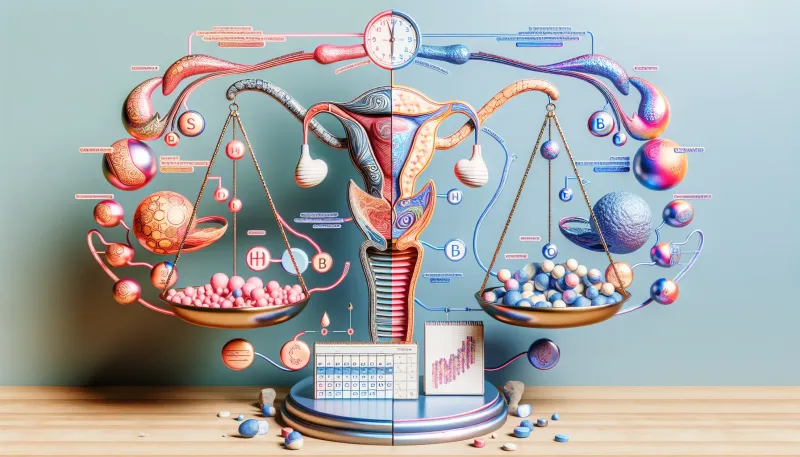How Hormonal Balance Impacts Your Menstrual Cycle: A Comprehensive Guide

Discover how hormonal balance influences your menstrual cycle. This comprehensive guide offers insightful information on maintaining hormonal harmony for a regular period.
Keywords: hormonal balance and menstrual cycle
Your menstrual cycle is a complex and intricate process governed by a delicate balance of hormones. Understanding how hormonal balance impacts your menstrual cycle is crucial for maintaining reproductive health and overall well-being. This comprehensive guide will delve into the nuances of hormonal regulation, the implications of imbalance, and actionable steps to achieve and maintain hormonal harmony.
Understanding the Menstrual Cycle
The Role of Hormones in the Menstrual Cycle
The menstrual cycle is regulated by a symphony of hormones, primarily estrogen and progesterone, but also including follicle-stimulating hormone (FSH) and luteinizing hormone (LH). These hormones orchestrate the various phases of the cycle, ensuring the proper functioning of the female reproductive system.
The Phases of the Menstrual Cycle
The menstrual cycle can be divided into four main phases:
- Menstrual Phase: The shedding of the uterine lining.
- Follicular Phase: FSH stimulates the growth of ovarian follicles, leading to the production of estrogen.
- Ovulation: A surge in LH triggers the release of an egg from the ovary.
- Luteal Phase: The corpus luteum forms and secretes progesterone, preparing the uterus for a possible pregnancy.
Hormonal Imbalance and Its Effects
Common Hormonal Imbalances
Hormonal imbalances can disrupt the menstrual cycle, causing irregularities or even cessation of periods. Common imbalances include:
- Polycystic Ovary Syndrome (PCOS): Elevated levels of androgens (male hormones) can interfere with ovulation.
- Hypothyroidism or Hyperthyroidism: Thyroid hormone imbalances can affect menstrual regularity.
- High Prolactin Levels (Hyperprolactinemia): Elevated prolactin can inhibit FSH and LH production, leading to irregular cycles.
Symptoms of Hormonal Imbalance
The symptoms of hormonal imbalance can vary widely, but common indicators include:
- Irregular periods or missed cycles
- Excessive menstrual bleeding or very light bleeding
- Severe menstrual cramps
- Weight gain or weight loss
- Mood swings, anxiety, or depression
- Acne or oily skin
- Fatigue or insomnia
Maintaining Hormonal Balance
Diet and Nutrition
Nutrition plays a vital role in maintaining hormonal balance. Incorporating the following dietary practices can support hormonal health:
- Eat a Balanced Diet: Include a variety of fruits, vegetables, whole grains, and lean proteins.
- Healthy Fats: Omega-3 fatty acids, found in fish and flaxseeds, can promote hormonal balance.
- Avoid Processed Foods: Limit intake of sugar and refined carbs that can contribute to hormonal imbalances.
Lifestyle Modifications
Making strategic lifestyle changes can also foster hormonal equilibrium:
- Regular Exercise: Engage in moderate exercise to help regulate hormones and alleviate stress.
- Stress Management: Practice stress-reducing techniques such as yoga, meditation, or deep breathing exercises.
- Adequate Sleep: Ensure you get 7-9 hours of quality sleep each night to maintain hormonal health.
Medical Interventions
For those experiencing severe hormonal imbalances, medical intervention may be necessary:
- Hormonal Therapy: Doctors may prescribe hormonal contraceptives or hormone replacement therapy to correct imbalances.
- Medication: Conditions like hypothyroidism may require specific medications to manage hormone levels.
- Regular Check-Ups: Routine medical visits can help monitor and manage hormonal health effectively.
Conclusion
Achieving and maintaining a harmonious balance of hormones is essential for the regularity and health of your menstrual cycle. By understanding the role of hormones, recognizing the symptoms of imbalance, and adopting a holistic approach to health, you can ensure a balanced and healthy menstrual cycle.
If you suspect a hormonal imbalance or experience significant menstrual irregularities, it is crucial to consult with a healthcare professional for appropriate diagnosis and treatment. Prioritizing your hormonal health is a foundational step towards overall well-being and reproductive health.



























